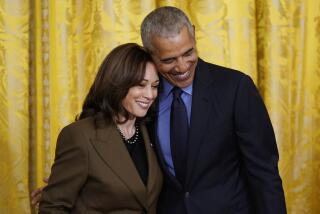Is Obama the new ‘black’?
WE KNOW this: Barack Obama is a rising star. He’s a powerful speaker and a gifted writer. He is the only African American serving in the U.S. Senate. But is he black?
That’s what New York Daily News columnist Stanley Crouch asked last month, and his answer was decidedly “no.” No, Crouch wasn’t just employing the old “blacker than thou” canard. Nor was he concerned with the fact that Obama was raised by his white mother. Rather, he was treating blackness not just as a racial (shared biology) identity but as an ethnic (shared historical experience) one. And isn’t that what the switch of terms from “black” to “African American” was all about?
Think back to the late 1980s, when the Rev. Jesse Jackson became the most prominent black to call for the adoption of the term African American. “Just as we were called colored, but were not that,” he said, “and then Negro, but not that, to be called black is just as baseless . Every ethnic group in this country has a reference to some land base, some historical cultural base. African Americans have hit that level of maturity.” The problem, of course, is that most black Americans are descendants of slaves who had their African cultural heritage brutally stripped from them.
What Crouch is arguing is that what the majority of black Americans share is their ancestors’ experience as human chattel, brought to these shores in the grips of chains. Slavery and segregation not only forged a rigid racial line between black and white but created a shared ethnic experience. For Crouch, the fact that Obama’s father — whom Obama met only once — was a black Kenyan who came to the U.S. to study at Harvard and the University of Hawaii removes him from the traditional black American narrative.
Author and essayist Debra Dickerson agrees. She believes that much of Obama’s popularity among whites stems from the fact that his family wasn’t part of the slave experience and therefore elicits no feelings of historical guilt. “The swooning from white people is a paroxysm of self-congratulation,” she said. But Dickerson also thinks that Obama’s thoughtful embrace of his African lineage has the potential to broaden the definition of what it means to be black in the United States. Indeed, the possibility of an Obama campaign for the presidency has already sparked an unusual — and potentially illuminating — debate about race.
It’s true that in our country, blackness is not a choice but rather something thrust on people who have any hint of African lineage. Traditionally, anyone with “one drop of African blood” has been considered black. But in recent decades, more children of black-white unions are choosing to buck the “one-drop rule” and call themselves biracial.
But in this respect, Obama is a traditionalist. He clearly chooses a black identity, but he does so even as he embraces his Midwestern Anglo roots. In other words, rather than straddling two identities or creating a new mixed one, he prefers to place himself within a single category and then expand it. In his lyrical yet interminable 1995 memoir, “Dreams From My Father,” Obama tells of his journey toward accepting his absent father’s legacy and coming to terms with his feelings of alienation from both sides of his family tree. Ultimately rejecting old-fashioned racial nationalism and narrow notions of authenticity, Obama encourages Americans to accept their messy racial inheritance. And though he admits that his personal story bears little resemblance to that of most African American families, he chose to graft his own personal story onto theirs.
The one-drop rule was developed to protect slavery and to maintain segregation. By defining all mixed children as black and compelling them to live in black communities, the rule enabled whites to believe in the fantasy of their own racial purity. By extension, blacks also came to embrace rigid notions of their relative purity from whiteness.
BUT LOOK closely at the historical record and you’ll find that plenty of prominent black political figures were at least half white, including Frederick Douglass and Booker T. Washington. In addition to his African ancestry, W.E.B. Du Bois could trace his roots back to France and the Netherlands. During Reconstruction, all but three of the 23 blacks in the House and Senate were some mixture of black and white. The list goes on.
The difference between now and then, of course, is the element of choice. Barack Obama does not remind Americans of the racial divide or of the chains that first created it. Instead, he points to an alternative history that Americans have never been able to achieve. “Symbolically, Obama’s parentage is the founding couple that America never accepted,” said Werner Sollors, who teaches African American literature at Harvard.
Crouch is right: Obama does not remind us of this nation’s original sin. But he does remind us of an opportunity that we as a nation are continually missing.
More to Read
Sign up for Essential California
The most important California stories and recommendations in your inbox every morning.
You may occasionally receive promotional content from the Los Angeles Times.










